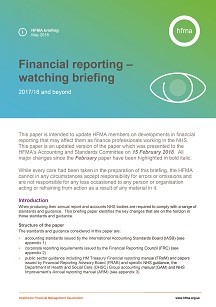Technical review - June 2018
NHS Improvement has published a costing assessment tool for acute services. It is intended to provide an objective assessment of the quality of costing at each trust and the degree to which patient-level costing standards have been implemented as costing practitioners move towards full implementation of the Healthcare costing standards – acute. The tool, the latest release as part of the Costing Transformation Programme, should be submitted to NHS Improvement on 21 September, with analysis dashboards issued back to submitting trusts in October.
A case study published by the HFMA demonstrates how one trust improved confidence in its costing data by triangulating the cost data with two national benchmarking sources – the Model Hospital and Getting it right first time. The case study describes how the external sources validated information clinical teams had been given to help understand financial losses in ophthalmology services over several years. It is available for download by members of the HFMA Costing for Value Institute as part of a growing collection of such resources.
Training materials have been released by NHS England to support invoice validation for integrated single finance system staff. The training relates to occasions when personal confidential data is included in scanned invoices requiring validation for patient care.
NHS England has updated its NHS standard contract technical guidance 2017-19. The guidance is applicable to the full length and shorter version of the contract and the updates include sections to support the new General Data Protection Regulation (GDPR).
NHS Improvement is giving intensive support to 50 acute trusts it believes have the greatest potential to improve recovery of costs from overseas visitors. In a provider bulletin, the oversight body said the trusts accounted for almost £44m of the potential £54m to be recovered. The new programme will look to recover 95% of this potential; increase the collection of invoiced income to reduce debt; introduce new techniques to identify chargeable patients; and develop metrics, including the Model Hospital, to help trusts review data.
No significant findings – indicating no material non-compliance with the Code of audit practice – were found in a review of a sample of NHS foundation trusts’ 2016/17 audits. The annual review, by the Quality Assurance Department of the Institute of Chartered Accountants in England and Wales, highlighted other matters in areas including: audit evidence; documentation of audit work; in-year FT authorisation; presentation of financial statements; letters of representation; and limited assurance reporting on quality report/indicators.
The International Accounting Standards Board (IASB) has issued a revised Conceptual framework for financial reporting. An updated Financial reporting watching briefing from the HFMA explains that the framework is not a standard itself but helps the IASB frame new standards and is available for entities to use when developing accounting policies in the rare cases that their transaction is not covered by an accounting standard. Key changes include the introduction of concepts on measurement and presentation.
The Treasury and HMRC have started a consultation on tax avoidance in the private sector, proposing that off-payroll rules will be changed in line with those made in the public sector. They have also published the results of research on the implementation of these changes in the public sector, which found the changes had minimal impact on how public bodies recruit and their ability to fill vacancies. However, there has been a small reduction in the use of off-payroll contactors and some impact on rates, particularly where the roles were for skills in short supply such as doctors and nurses. A fact sheet on the proposals said the public sector reform had raised an additional £410m of income tax.
Related content
The Institute’s annual costing conference provides the NHS with the latest developments and guidance in NHS costing.
The value masterclass shares examples of organisations and systems that have pursued a value-driven approach and the results they have achieved.